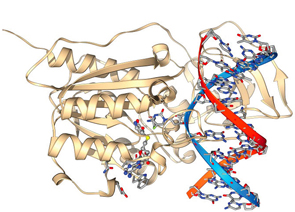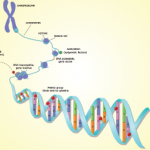
Image Credit: Laguna Design/sciencesource.com
A presentation given during FOCIS 2015, the 15th annual meeting of the Federation of Clinical Immunity Societies in June 2015 in San Diego, focused on advances in stem cell research related to treatment of cancer and the function that particular enzymes play in disease.
Anjana Rao, PhD, professor at the La Jolla Institute for Allergy and Immunology in San Diego, discussed her research on epigenetics—the process by which genetic information is modified without changing the underlying DNA sequence—and how it influences the function of the immune system by turning genes on and off.
The research undertaken by Dr. Rao has led to seminal, molecular-level discoveries and insights of the immune system, which helps keep the body healthy and plays a key role in cancer and other diseases, Mark Anderson, MD, PhD, of the University of California, San Francisco, told the audience in his introductory remarks.
DNA Methylation
Dr. Rao focused her presentation on the family of TET (ten-eleven translocations) proteins and their role in promoting DNA cytosine demethylation. The proteins regulate gene expression through oxidation of 5-methylcytosine (5mC) and are named after the rare ten-eleven translocation observed in cases of acute myeloid and lymphocytic leukemia.
There are three TET proteins in humans, mice and other mammals that have been the subject of research as it relates to embryonic stem cells and the development and treatment of cancer. The TET enzymes interact with DNA and help maintain potency in stem cells.
Dr. Rao began her lecture with a discussion of DNA methylation at the 5 position of cytosine. Known as the fifth base in the DNA genome, 5mC is an epigenetic mark created by DNA methyltransferases that plays an essential role in genome regulation and biological development and disease.
TET proteins sequentially oxidize this methyl group by converting 5mC into 5-hydroxymethylcytosine (5-hmC). When the methyl group is added to DNA through the methylation process—a vital part of biological growth and development—it acts as a chemical switch to turn genes on and off.
“What the TET enzymes and other enzymes of this class, known as dioxygenases, are doing is [using] oxygen and 2-oxoglutarate as substrates,” Dr. Rao said. “Therefore, TET enzymes can link metabolism and oxygen sufficiency to epigenetic changes in the genome.”
Scientists have studied how aberrant DNA methylation is able to shut off genes that would normally suppress cancerous tumors, effectively keeping disease at bay. Disruptions in the DNA methylation cycle, including loss of function of TET proteins, have been linked to tumor onset and progression.
TET Function

Dr. Rao


